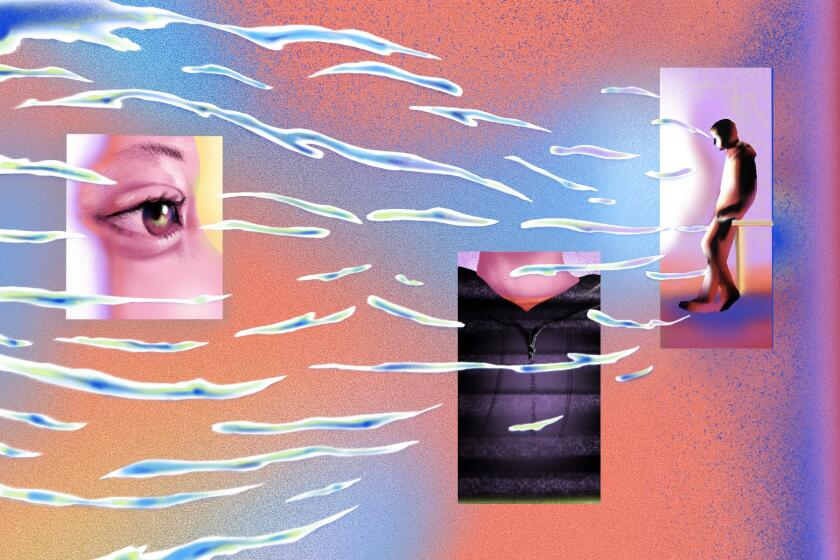The debate over circumcising baby boys
This November, voters in San Francisco are expected to weigh in on a controversial topic: whether parents should be allowed to circumcise their baby boys.
The proposition, backed by members of an anti-circumcision group that calls its members “intactivists,” has ignited heated debate.
It’s hardly a new issue. Historians have found evidence of circumcision dating to ancient Egypt. Since then, the practice has gone in and out of public favor for myriad reasons, including hygiene, religion, cultural norms and beliefs about masculinity. Circumcised men are now in the minority worldwide, but they are the vast majority in the U.S.
Major medical associations have not yet taken a stance. The American Academy of Pediatrics states that circumcision has both risks and benefits and that parents should be given all the information available to make an informed decision. The Centers for Disease Control and Prevention is working on recommendations regarding the practice, but they have yet to be released.
In the meantime, those in favor of circumcision say it promotes health and hygiene, while those opposed say it’s an unnecessary medical procedure that amounts to mutilation.
Read on for two views.
Circumcision is not medically necessary, is unethical and can cause irreversible harm to men.
Georganne Chapin is the founding executive director of Intact America and the founder of Hudson Center for Health Equity & Quality, a nonprofit organization devoted to improving access to healthcare.
My argument against circumcision of children and infants is no more and no less than that it’s a human rights issue. All people, male as well as female, are entitled to bodily integrity, and nobody — for any reason — has the right to cut off part of another person’s body when that person is too young to understand and to consent.
Under bioethical principles, parental consent for medical treatment is permitted only if the treatment being considered will save the life or health of the child. Circumcision is not medically necessary, and so it violates those principles, as well as that child’s entitlement to a complete body, his own personal freedom and autonomy.
There are medical risks involved with circumcision. The baby loses the protective function of the foreskin, which means that the head of the penis can build up extra layers of skin, or the baby could develop skin ridges, a bent penis or sexual dysfunction later in life. A study published in the British medical journal Lancet in 1997 demonstrated that babies who have been circumcised have a lower pain threshold for subsequent immunizations; they are extremely distressed, their cries are different. There is also a risk of infection and death, or of a botched procedure.
The foreskin serves a number of purposes sexually. It contains thousands of nerve endings, and if you’re cutting off such an exquisitely sensitive body part you’re going to lose sexual sensitivity. During intercourse, the foreskin also provides a natural gliding action and a lubricating function that’s lost if the person is circumcised.
In this country, we’ve made female genital cutting a crime and grounds for refugee status, but we do the same thing to boys that other cultures do to girls. Those in favor of male circumcision say that one is mutilation and the other is helpful, but the act of cutting off part of a child’s genitals is the same, whether it’s a boy or a girl.
Some men even say that they have post-traumatic stress disorder that they associate with their circumcision as infants. I think we would have no trouble believing that from a woman, but we write off men’s trauma and recollection as being whining and unmanly.
Circumcision is a so-called cure that’s in search of a disease. The vast majority of men in the world are intact, and they are not suffering from illness or infection. There is no justification for cutting off a body part for a hypothetical future disease, especially ones like STDs that can be prevented in ways that don’t involve mutilation. It’s crazy that we don’t think it’s crazy.
Circumcision is safe, prevents certain health problems and should be available to those who want it.
Daniel Halperin is a lecturer in international health at the Harvard School of Public Health.
Circumcision provides a number of health benefits. It reduces the risk of HIV and penile cancer in men. It also reduces the risk of several other sexually transmitted infections in both men and women, including syphilis and herpes, and of cervical cancer in women. Urinary tract infections in infants are about 10 times less likely if the boy has been circumcised.
In Africa, there have been three randomized trials — two published in the journal Lancet in 2007 and one in the journal PLoS Medicine in 2005 — demonstrating that circumcision reduces heterosexual HIV infection in men by at least 60%. The foreskin provides a ready access to cells that are the entry point for HIV because the skin there is very soft and permeable, making it more vulnerable to infection. The area underneath the foreskin is also humid and provides a hospitable environment for infections, whereas they can’t proliferate as well on the dry skin of the circumcised penis.
In countries where there is not good access to running water, another reason to circumcise is hygiene. And in a study of nurses in a U.S. geriatric unit, about 90% were strongly in favor of circumcision because it was difficult to bathe uncircumcised men in their 90s. When we look at a baby and we think about circumcision, we have to think not just about that baby but that he’s going to turn into a man and, eventually, an old man.
The risks associated with circumcision are very low, with fewer than 1% of procedures resulting in complications.
In terms of sexual satisfaction, some research has found that men who are circumcised enjoy a wider range of sexual activities. It can also help prevent premature ejaculation in men.
As of 2009, there were 16 states in which Medicaid didn’t cover circumcision. If parents in those states want their kids to get circumcised, they have to pay out of pocket, and it can cost hundreds of dollars.
If circumcision has health benefits, and the parents want to do it for medical or religious or other reasons, that should be allowed and the access should be there. And in those parts of the world that have very high rates of heterosexual HIV transmission, I would like to see circumcision be much more accessible.
I’m not interested in pushing circumcision but in making the service readily available to everybody who wants it.
More to Read
Sign up for our L.A. Times Plants newsletter
At the start of each month, get a roundup of upcoming plant-related activities and events in Southern California, along with links to tips and articles you may have missed.
You may occasionally receive promotional content from the Los Angeles Times.






